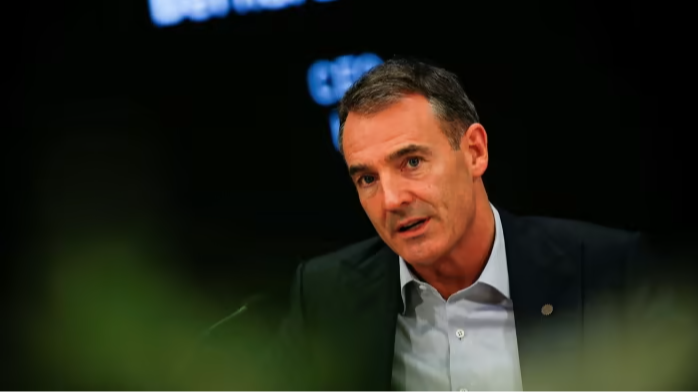Receive free World updates
We’ll send you a myFT Daily Digest email rounding up the latest World news every morning.
This article is an on-site version of our FirstFT newsletter. Sign up to our Asia, Europe/Africa or Americas edition to get it sent straight to your inbox every weekday morning
Good morning.
Bernard Looney has resigned as chief executive of BP after admitting he failed to disclose the extent of past personal relationships with colleagues, the company has said.
Looney, 53, is to be replaced by Murray Auchincloss, the oil major’s chief financial officer, “on an interim basis”, the company said in a statement yesterday.
Looney had told the company earlier in the day that “he was not fully transparent in his previous disclosures”, BP said, confirming a report by the Financial Times. “He did not provide details of all relationships and accepts he was obligated to make more complete disclosure.”
Looney joined the 113-year-old energy group when he was 21 and has spent his entire career with the company. He was appointed chief executive in 2020. Here are more details on his departure, which comes as investors remain sceptical about some of the company’s plans.
Here’s what else I’m keeping tabs on today:
-
Economic data: US inflation is expected to have risen last month when headline figures are released today. The UK publishes revised gross domestic product figures for July, while the EU has industrial production data for the same month. The International Energy Agency issues its monthly Oil Market Report.
-
Arm IPO: The SoftBank-backed UK chip designer is expected to announce the final pricing of its initial public offering, set to be the biggest in nearly two years.
-
European Commission: President Ursula von der Leyen delivers her 2023 EU State of the Union address at the European parliament in Strasbourg.
Join our subscriber-only webinar today (12:30-13:30 GMT+1) on China’s economic slowdown, featuring FT experts on the world’s second-largest economy. Send in your questions and register for free here.
Five more top stories
1. Exclusive: Deutsche Bank continued to sell risky foreign exchange derivatives to companies in Spain that had suffered big losses from such products. The sales were made even after an internal inquiry, started in 2019 following a whistleblower complaint, found that staff exploited flaws in the bank’s controls and broke EU rules. Read the full story.
2. UBS has begun moving Credit Suisse out of its Canary Wharf offices, telling staff yesterday that teams would go to UBS’s head office in the City. All staff are expected to leave by the end of next year, according to people with knowledge of the plans. Here’s more on the latest blow to the London financial district.
3. Birkenstock has unveiled its filing for an initial public offering in New York with a target valuation of more than $8bn. The German sandal maker’s owner L Catterton is aiming to list the company during the week beginning October 9. It would be the private equity firm’s second public offering of one of its portfolio companies in months. Here’s why confidence in US listings is building up.
4. Apple has launched four new iPhones and two updated Watches as it tries to tempt consumers who are holding on to their devices for longer. Pricing for the iPhone 15 Pro Max will start at $1,199 — $100 more than a year ago — reflecting Apple’s strategy of making up for stagnant unit sales with higher average selling prices. Patrick McGee has more details from Apple’s California launch event.
5. Austria’s longest-serving spymaster has warned about Russian links to the country’s hard-right Freedom party, which has been leading polls ahead of next year’s election. In an unusual public intervention, Peter Gridling, who led the Austrian intelligence service between 2008 and 2020, cautioned that the party had remained in contact with Russia since his tenure. Here’s more from his interview with the FT.
The Big Read
The release of ChatGPT in November spurred a rush of feverish excitement over artificial intelligence’s applications but also increased awareness of its dangers — the potential to spread misinformation during elections, replacing jobs and one day becoming more intelligent than and superseding humans. While regulators and companies have been loud in voicing the need to control AI, ideas on how to do so have diverged widely.
We’re also reading . . .
Chart of the day
Italy, Belgium and Portugal have issued about €60bn worth of bonds directly to households so far this year, up from €26bn last year. The retail push by European countries is partly designed to press high street banks into raising the interest rates they pay to depositors.
Take a break from the news
Lake Khovsgol is located in one of Mongolia’s most remote regions. With temperatures of -12C, it might seem like the last place you would want to visit. Not so for Tim Moore, who participated in the Mongol 100 bike race, pledging to traverse 160km of the frozen lake “by any means necessary”.
Additional contributions from Benjamin Wilhelm and David Hindley
Recommended newsletters for you
Working It — Everything you need to get ahead at work, in your inbox every Wednesday. Sign up here
One Must-Read — The one piece of journalism you should read today. Sign up here
